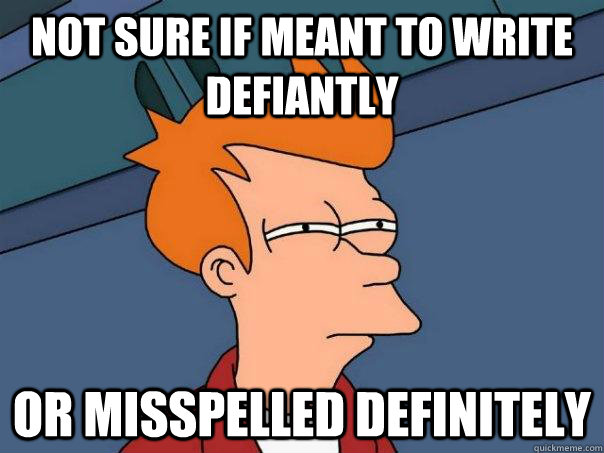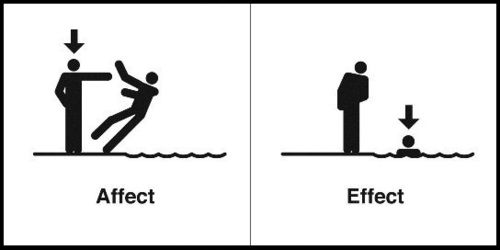1. Their/They're/There
It's been said time and time again, but people STILL overlook this simple difference. And because it is so simple, slipping up can make you appear less intelligent that you clearly are. - Whose book is this? It's their book.= it is the book owned by them. - Where are they? They're in Spain.
= they are. - Where did you put my book? Over there.
= the book is in that place.
2. Your/You're
Chances are, you've probably watched that Friends episode. Ross has some very wise words of wisdom regarding this particular point... - Which top do you want to borrow? Your blue one.
- Which top do you want to borrow? Your blue one.= the blue top that you own. - What time does it start? 8pm, so you're going to be late.
= you are.
3. Definitely
The amount of variations I've seen in the spelling of this word is amazing. Apparently in 2009, definitely was revealed as the most difficult word to spell for native Brits (so you're not alone if you struggle with this one). - I will defiantly be there. - Oh so you'll be there but you won't be happy about it? Right. - I will definately be there. - Ew, gross. - I will defnitly be there. - I might vomit. Just like you learnt how to spell 'because' with the help of some elephants, and that 'business' is bus-i-ness, 'definitely' can be split into definite + ly because it is DEFINITE that you will be there.
4. Its/It's
I'll admit, I've always struggled to remember which one is which when it comes to this example. So here's how to remember: - Where is it? It's over there.= it is. - Is your new room nice? Yeah, its walls are cream.
= the walls of the room are cream. You wouldn't say 'it's walls are cream' because that would mean 'it is walls are cream'.
5. Quite/Quiet
With spellcheck happy to allow either of these, you just need to remember which one applies to the right situation. - Can you turn up the music, it's too quiet. - Can you turn down the music, it's quite loud.6. Whose/Who's
Again, what linguists describe as homophones (words that have the same pronunciation, but different spellings and meaning) cause a lot of trouble when you translate them from spoken to written language. With the contracted form who's, just remember that it mean 'who is', while whose is a possessive structure. - Who's coming to the party?=who is. - Whose coat is this?
=the coat is owned by 'who'.
7. Affect/Effect
This one's a bit tricky because they are both nouns and verbs that mean slightly different things. Verbs:
Affect is used when you are saying that something changed or influenced something else.
e.g. Her tiredness affected her work.
Effect is used when something is a result or a product of something/someone's actions.
e.g. The management effected a change in the pension plan.
Nouns:
An effect is something brought about by a cause, also: a result
e.g. The paracetamol had an immediate effect.
An affect is in reference to an emotion, but it's rarely used so you don't need to worry too much.
Verbs:
Affect is used when you are saying that something changed or influenced something else.
e.g. Her tiredness affected her work.
Effect is used when something is a result or a product of something/someone's actions.
e.g. The management effected a change in the pension plan.
Nouns:
An effect is something brought about by a cause, also: a result
e.g. The paracetamol had an immediate effect.
An affect is in reference to an emotion, but it's rarely used so you don't need to worry too much.
8. Should have/Should of
Another pet peeve of mine is when people get this mixed up. Put simply, 'should of' isn't grammatical, so try to be aware of this in written communication, especially when a potential job is up for grabs. Even though the contraction 'should've' sounds like 'should of', it's actually from 'should have', hence the spelling. e.g. You're late! Sorry, I should have/should've set my alarm earlier.
e.g. You're late! Sorry, I should have/should've set my alarm earlier.
9. Genuinely/Generally
Just like the confusion with definitely and defiantly, genuinely and generally mean two very separate things. If something is genuine, it is real and not fake. So if something genuinely happened, it really did happen and you're putting emphasis on its validity. e.g. Was the party good? It was genuinely really good. If something is general, it is common and not specific. So if something generally happens, it happens commonly. e.g. Was the party good? Well her parties are generally good, but this one was not.10. Fewer/Less
 Fewer is used when you want to refer to items that you can count.
e.g. Can I have fewer raisins please?
Less is used when you want to refer to items that you can't count, or there is no point in counting.
e.g. Can I have less attitude please?
or Can I have less money please? (not that anyone would ever say this).
Fewer is used when you want to refer to items that you can count.
e.g. Can I have fewer raisins please?
Less is used when you want to refer to items that you can't count, or there is no point in counting.
e.g. Can I have less attitude please?
or Can I have less money please? (not that anyone would ever say this).



